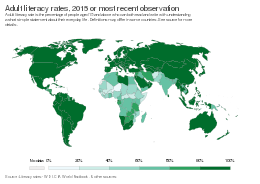
Back Geletterdheid Afrikaans Alphabetisierung (Lesefähigkeit) ALS Alfabetización AN محو الأمية Arabic تسكويل ARY সাক্ষৰতা Assamese Alfabetización AST Уҡый-яҙа белеү Bashkir Raštingoms BAT-SMG Граматнасць Byelorussian
This article may be too long to read and navigate comfortably. When this tag was added, its readable prose size was 14,000 words. (April 2023) |
| Part of a series on |
| Reading |
|---|
 |
Literacy in its broadest sense describes "particular ways of thinking about and doing reading and writing"[1] with the purpose of understanding or expressing thoughts or ideas in written form in some specific context of use.[2] In other words, humans in literate societies have sets of practices for producing and consuming writing, and they also have beliefs about these practices.[3] Reading, in this view, is always reading something for some purpose; writing is always writing something for someone for some purpose.[4] Beliefs about reading and writing and their value for society and for the individual always influence the ways literacy is taught, learned, and practiced.[5]
H.S. Bhola described Sarah Gudschinsky's definition of literacy as "essential": "A person is literate who can 'read and understand everything he would have understood if had been spoken to him; and can write, so that it can be read, anything he can say'."[6] This definition focuses on comprehension and was created thinking of mother "tongue literacy" and does not include reciting passages in another language that the person does not understand.
Some researchers suggest that the study of "literacy" as a concept can be divided into two periods: the period before 1950, when literacy was understood solely as alphabetical literacy (word and letter recognition); and the period after 1950, when literacy slowly began to be considered as a wider concept and process, including the social and cultural aspects of reading and writing[7] and functional literacy.[8][9]

- ^ Street, Brian (2001). "Introduction". Literacy and Development: Ethnographic Perspectives. London: Routledge. p. 11.
- ^ Rowsell, Jennifer; Pahl, Kate (2020). The Routledge Handbook of Literacy Studies. Routledge. ISBN 978-0-367-50172-3.
- ^ Calvet, Louis-Jean (1999). Towards an Ecology of World Languages. Cambridge: Polity. ISBN 978-0-7456-2956-8.
- ^ Lankshear, Colin; Knobel, Michelle (2007). "Sampling the 'New' in New Literacies". A New Literacies Sampler. New York: Peter Lang. p. 2. ISBN 978-0-8204-9523-1.
- ^ Lindquist, Julie (2015). "Literacy". Keywords in Writing Studies. Logan: Utah State UP. pp. 99–102.
- ^ p. 30. Bohla, H.S. A Source Book for Literacy. Paris: UNESCO. 1994.
- ^ Gee, James (1991). "Socio-Cultural Approaches to Literacy (Literacies)". Annual Review of Applied Linguistics. 12: 31–48. doi:10.1017/S0267190500002130. S2CID 146415110.
- ^ Dijanošić, B. (2009). "Prilozi definiranju pojma funkcionalne pismenosti" [Contributions to the definition of functional literacy] (PDF). Journal of the Croatian Andragogy Society (in Croatian): 25–35.
- ^ Réka, Vágvölgyi; Bergström, Aleksandar; Bulajić, Maria Klatte; Falk, Huettig (May 2019). "Understanding functional illiteracy from a policy, adult education, and cognition point of view: Towards a joint referent framework". Zeitschrift für Neuropsychologie. 30 (2): 111. doi:10.1024/1016-264X/a000255. S2CID 191662777.
- ^ "Adult literacy rates, 2015 or most recent observation". Our World in Data. Retrieved 15 February 2020.